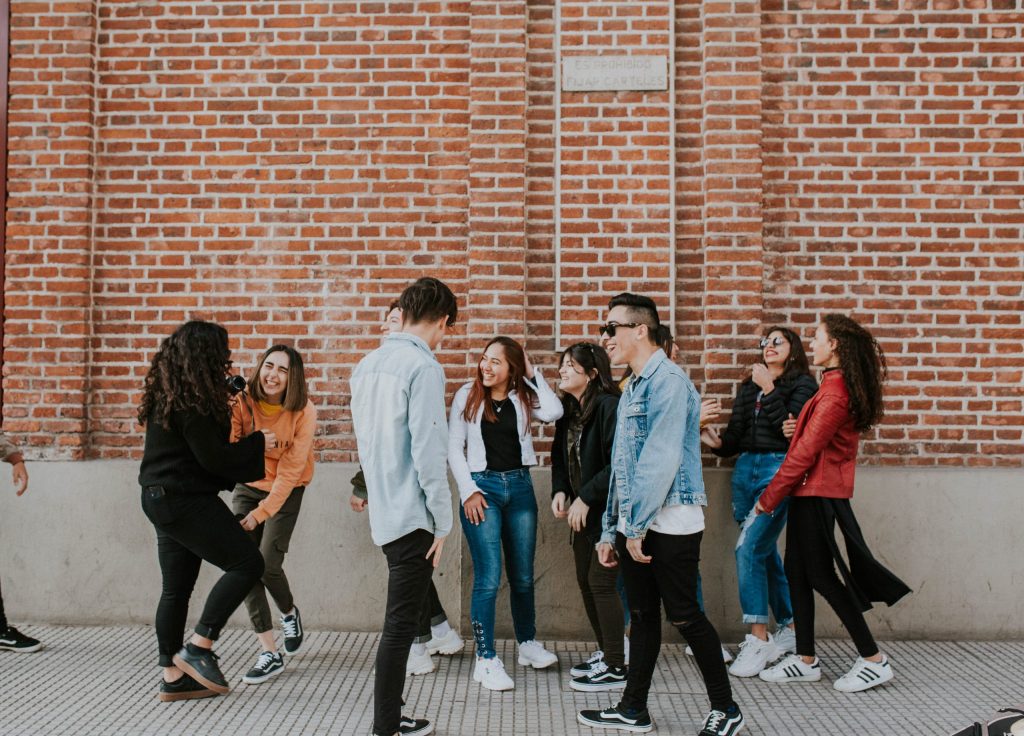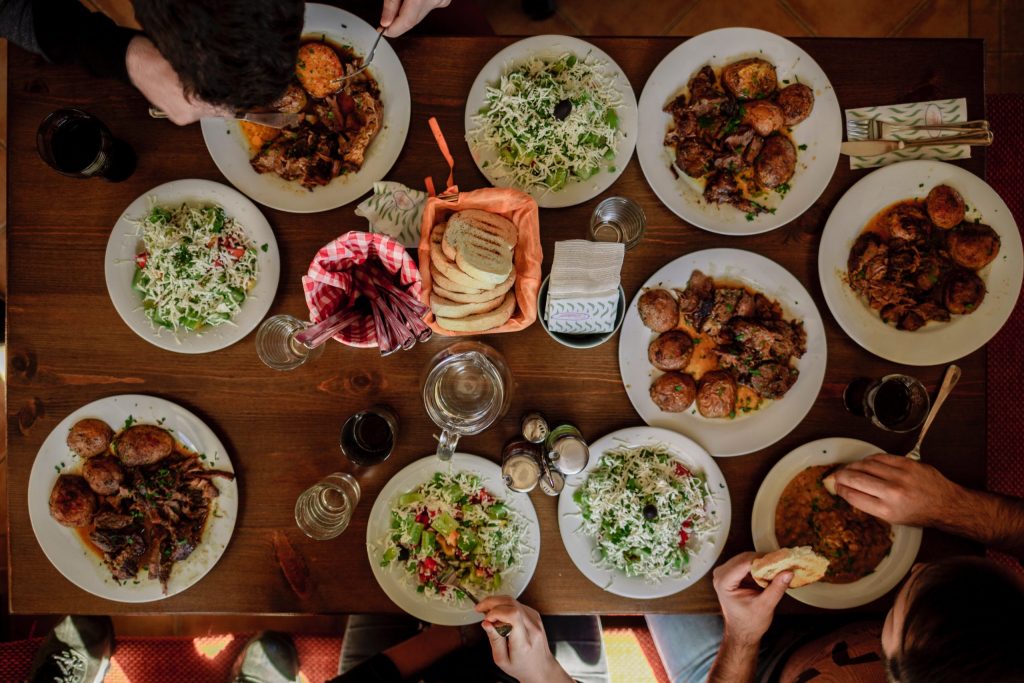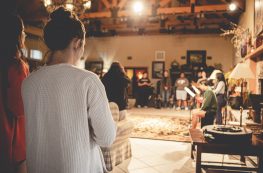“This is not our land. None of us own this country, this town, this neighborhood. We are not the hosts. We are merely guests; the whole earth is God’s. We live on God’s land by God’s invitation.”
By Catherine McNiel, excerpted from the book Fearing Bravely
I sat at a small conference table, sipping tea and interviewing people for a feature-length article. A large and well-resourced church nearby had spent ten years and millions of dollars investing in the local community: teaching English as a second language, teaching adults to read and write for the first time, helping kids succeed at school, being a well-resourced friend during times of crisis, being good neighbors to the community. Now, to celebrate ten years of beautiful relationship-building, I was sent to interview dozens of people—clients and recipients as well as staff and volunteers. The editor’s expectation was that my article would show donors how thousands of hours of love poured out by hundreds of volunteers had made an enormous impact on the recipients—and the truth did not disappoint. Redemption shone through in every interview. Hundreds of children, adults, and families experienced long- term life change because a church moved into the neighborhood and chose to be proximal in a relational sense, not merely sharing a zip code.
But that was not all my interviews brought to light. Over and over I found that the volunteers who invested in relationships with their neighbors found themselves to be on the receiving end, themselves the ones in need of a neighbor and friend. Unbeknownst to them, they were the ones needing to be loved, impacted, helped, and healed, just as much as the people they had come to serve. The volunteers’ worldviews, hearts, families, and futures were shaped, redeemed, and changed forever by living in relationship with their “under-resourced” neighbors—who willingly, joyfully, and generously poured themselves out, again and again, opening up their arms and enveloping the volunteers into new homes and families; teaching them insights about God; feeding their bodies, minds, and spirits; and carrying them during times of crisis. Neighbors held babies and brought dinner and taught loyalty and laughter. The change that took place in this community was alchemical—taking two ingredients and transforming them into something entirely new. The magic had an effect on everyone, English speakers and English learners, financially stable and financially vulnerable. Each needed the other. And each had plenty to offer the other. Together, they filled in all the gaps. The giving was never a one- way street.

Photo credit: Nicolas Lobos
This is the kind of reciprocal, joy- filled relationship most of us long to have with one another. But as we seek to pivot from isolation to service, we must do so with an awareness of our own vulnerabilities. Those of us with an abundance of material resources often feel a sense of superiority over those who live differently, even though we may not consciously realize it. Rather than seeking a true relationship based on mutuality and trust, we often give charity with an unconscious assumption that “they” are in need and “we” are not, that we have something they lack. Our motivations may be pure, but the result is condescension. There is no faster way to destroy a community— not to mention a relationship—than deadly self-righteousness.
Healthy relationships always go both ways. In healthy relationships, we do not serve our communities because others need the charity we are good enough to provide. When we reach out our hands and hearts in friendship, we ourselves take a risk. We open ourselves up to give and receive, acting not out of benevolent superiority but out of neighborliness.
A few years ago, we invited our neighbors over for Thanksgiving. Though they had lived in the US for over ten years, like most newcomers to our country, they had never, not once, been invited to eat a Thanksgiving dinner. They poked each other gleefully, chuckling at our traditions, decorations, and food. A whole bird! Little statues of people dressed up in odd clothing! They nibbled at the food politely. Squash in a pie? Seeing our traditions through their eyes brought a whole new level of enjoyment to my extended family. In return, they invited us to celebrate Día de los Reyes, where my family giggled and fidgeted, chuckling at new traditions and foods. Drinks made from rice? Plastic babies in the cake?
The following Thanksgiving, a well-meaning donor deposited dozens of frozen turkeys at the community-service organization my husband leads, a nonprofit ministry serving our neighborhood. The donor’s intentions were wonderful; most of us could use a hand with the grocery budget over the holidays, even more so those struggling to make ends meet. But because he lacked knowledge of and relationship with the people he hoped to bless, his execution was far off the mark. Encumbered by so much generosity, my husband and his staff spent days going door to door, attempting to offload these frozen birds. The residents of our neighborhood— many of whom are immigrants and refugees from around the world— were unfamiliar with large, frozen turkeys and simply did not know what to do with them. Most graciously accepted, far too polite to turn down a gift, but this well-intended donation became a burden for everyone involved.

Photo credit: Stefan Vladimirov
Days later, an unending stream of cornhusk-wrapped tamales started showing up at our door in a neighborly show of reciprocity. Unsure what to do with a turkey, our neighbors turned them into piles and piles of tamales.
Was this donor loving his neighbors? His heart was in the right place. But his story highlights our desperate need for two-way relationships rather than distant charity. We need proximity, a willingness to assimilate a bit into the rhythms and life-experiences of our neighbors, and enough vulnerability to invite them into our own. We will not know how to love others effectively if we do not know them. We will not learn them if we structure our lives so that we do not intersect.
And we will not restructure our lives if our posture toward our neighbors is one of fear rather than love.
This is not our land. None of us own this country, this town, this neighborhood. We are not the hosts. We are merely guests; the whole earth is God’s. We live on God’s land by God’s invitation. Our fellow humans are roommates and equals. We treat each other with dignity and kindness because God has made the terms clear: If we live on God’s land, this is how we behave. We serve each other because those are the provisions of the lease God drew up.
Featured image photo credit: Toa Heftiba
You’ve been reading from
Fearing Bravely by Catherine McNiel
Jesus commands us to love our neighbors. So why are so many Christians taught to fear their neighbors? The American church is known as a people who are afraid, who have been nurtured through fear into hatred, and who have moved from hatred to violence—or at least to neglect. This fear, too often lived out boldly in the name of Jesus, is a false religion.
God instructs us to welcome strangers. We are not to withhold hospitality or help from anyone in need. So why do we fear strangers, especially those needing hospitality, afraid that their presence may threaten what we have?
Jesus taught us to love our enemies. We are to pray for those who actively harm us. Instead, we create enemies in our minds, seeing anyone who thinks, believes, looks, or lives differently from us as dangerous, a threat to our way of living.
The Christian community exists to declare and demonstrate God’s love and to follow Jesus in practicing love over fear, even in unsafe times and places. It’s time to reclaim our brave fear of God and risk transformative love for the sake of our neighbors, the strangers among us, and our enemies.
We are people of the Kingdom. Fearing Bravely teaches us that we have nothing to fear. Instead, we can respond to our fear problem with a brave love that emerges from choosing to let our fear of God overcome our fear of everything else.
Catherine McNiel writes with conviction, wisely guiding us to recognize our fear and, with God’s help, not let it limit us to love courageously all who are among us.





